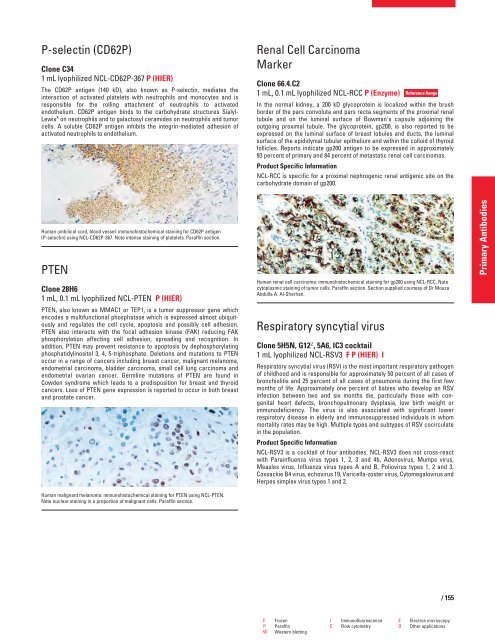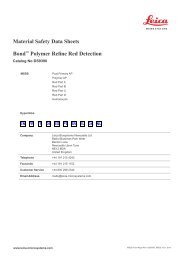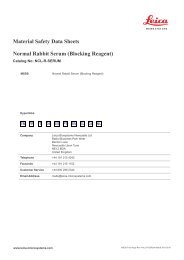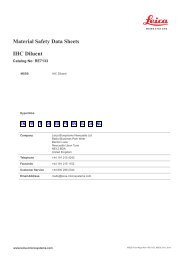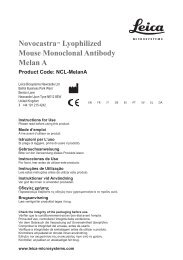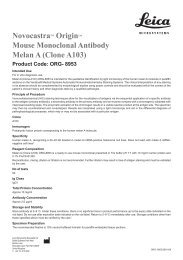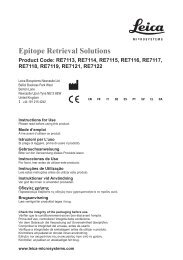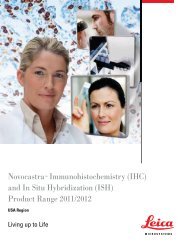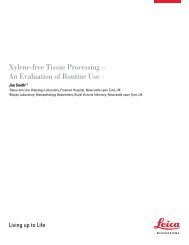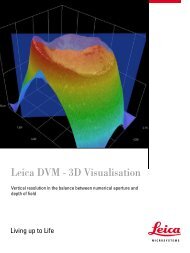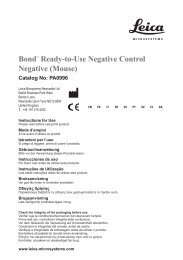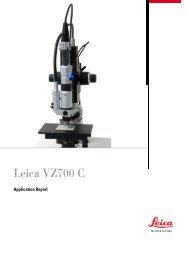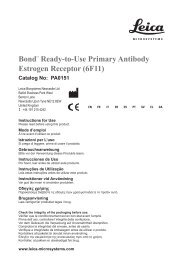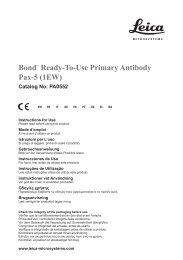Labelling Review row-Online
Labelling Review row-Online
Labelling Review row-Online
Create successful ePaper yourself
Turn your PDF publications into a flip-book with our unique Google optimized e-Paper software.
P-selectin (CD62P)<br />
Clone C34<br />
1 mL lyophilized NCL-CD62P-367 P (HIER)<br />
The CD62P antigen (140 kD), also known as P-selectin, mediates the<br />
interaction of activated platelets with neutrophils and monocytes and is<br />
responsible for the rolling attachment of neutrophils to activated<br />
endothelium. CD62P antigen binds to the carbohydrate structures Sialyl-<br />
Lewis x on neutrophils and to galactosyl ceramides on neutrophils and tumor<br />
cells. A soluble CD62P antigen inhibits the integrin-mediated adhesion of<br />
activated neutrophils to endothelium.<br />
Human umbilical cord, blood vessel: immunohistochemical staining for CD62P antigen<br />
(P-selectin) using NCL-CD62P-367. Note intense staining of platelets. Paraffin section.<br />
PTEN<br />
Clone 28H6<br />
1 mL, 0.1 mL lyophilized NCL-PTEN P (HIER)<br />
PTEN, also known as MMAC1 or TEP1, is a tumor suppressor gene which<br />
encodes a multifunctional phosphatase which is expressed almost ubiquitously<br />
and regulates the cell cycle, apoptosis and possibly cell adhesion.<br />
PTEN also interacts with the focal adhesion kinase (FAK) reducing FAK<br />
phosphorylation affecting cell adhesion, spreading and recognition. In<br />
addition, PTEN may prevent resistance to apoptosis by dephosphorylating<br />
phosphatidylinositol 3, 4, 5-triphosphate. Deletions and mutations to PTEN<br />
occur in a range of cancers including breast cancer, malignant melanoma,<br />
endometrial carcinoma, bladder carcinoma, small cell lung carcinoma and<br />
endometrial ovarian cancer. Germline mutations of PTEN are found in<br />
Cowden syndrome which leads to a predisposition for breast and thyroid<br />
cancers. Loss of PTEN gene expression is reported to occur in both breast<br />
and prostate cancer.<br />
Human malignant melanoma: immunohistochemical staining for PTEN using NCL-PTEN.<br />
Note nuclear staining in a proportion of malignant cells. Paraffin section.<br />
Renal Cell Carcinoma<br />
Marker<br />
Clone 66.4.C2<br />
1 mL, 0.1 mL lyophilized NCL-RCC P (Enzyme)<br />
In the normal kidney, a 200 kD glycoprotein is localized within the brush<br />
border of the pars convoluta and pars recta segments of the proximal renal<br />
tubule and on the luminal surface of Bowman's capsule adjoining the<br />
outgoing proximal tubule. The glycoprotein, gp200, is also reported to be<br />
expressed on the luminal surface of breast lobules and ducts, the luminal<br />
surface of the epididymal tubular epithelium and within the colloid of thyroid<br />
follicles. Reports indicate gp200 antigen to be expressed in approximately<br />
93 percent of primary and 84 percent of metastatic renal cell carcinomas.<br />
Product Specific Information<br />
NCL-RCC is specific for a proximal nephrogenic renal antigenic site on the<br />
carbohydrate domain of gp200.<br />
Human renal cell carcinoma: immunohistochemical staining for gp200 using NCL-RCC. Note<br />
cytoplasmic staining of tumor cells. Paraffin section. Section supplied courtesy of Dr Mouza<br />
Abdulla A. Al-Sharhan.<br />
Respiratory syncytial virus<br />
Clone 5H5N, G12 2 , 5A6, IC3 cocktail<br />
1 mL lyophilized NCL-RSV3 F P (HIER) I<br />
Reference Range<br />
Respiratory syncytial virus (RSV) is the most important respiratory pathogen<br />
of childhood and is responsible for approximately 50 percent of all cases of<br />
bronchiolitis and 25 percent of all cases of pneumonia during the first few<br />
months of life. Approximately one percent of babies who develop an RSV<br />
infection between two and six months die, particularly those with congenital<br />
heart defects, bronchopulmonary dysplasia, low birth weight or<br />
immunodeficiency. The virus is also associated with significant lower<br />
respiratory disease in elderly and immunosuppressed individuals in whom<br />
mortality rates may be high. Multiple types and subtypes of RSV cocirculate<br />
in the population.<br />
Product Specific Information<br />
NCL-RSV3 is a cocktail of four antibodies. NCL-RSV3 does not cross-react<br />
with Parainfluenza virus types 1, 2, 3 and 4b, Adenovirus, Mumps virus,<br />
Measles virus, Influenza virus types A and B, Poliovirus types 1, 2 and 3,<br />
Coxsackie B4 virus, echovirus 19, Varicella-zoster virus, Cytomegalovirus and<br />
Herpes simplex virus types 1 and 2.<br />
F Frozen I Immunofluorescence E Electron microscopy<br />
P Paraffin C Flow cytometry O Other applications<br />
W Western blotting<br />
/ 155<br />
Primary Antibodies


